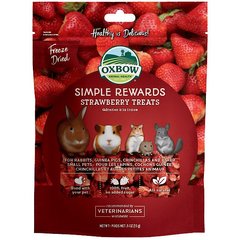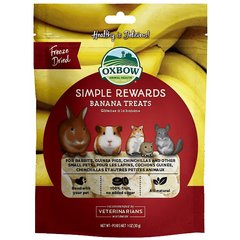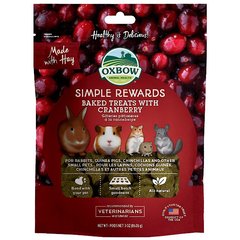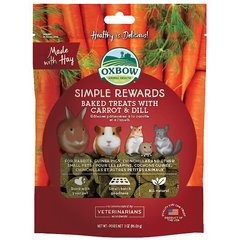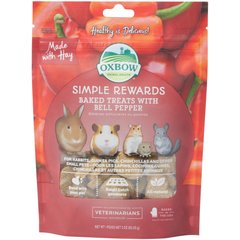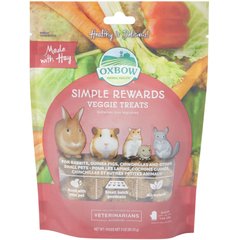What Fruits and Vegetables Can Rabbits Eat? Carrots, Strawberries and More
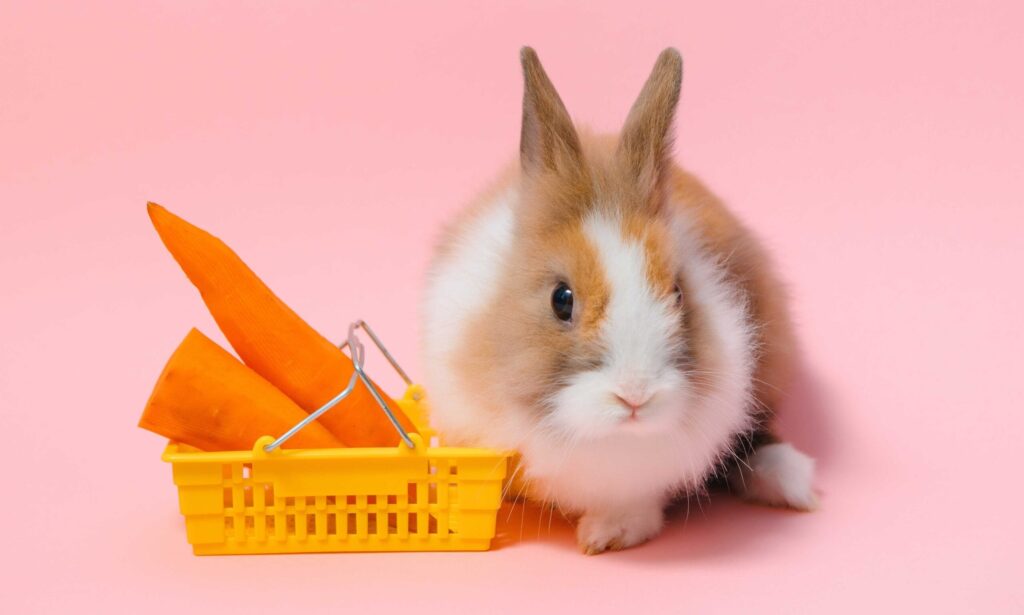
Photo by iStock.com/Serhii Hryshchyshen
While most of us know rabbits can eat carrots, are you aware there’s a long list of both fruits and vegetables your rabbit can safely consume? It’s true. Rabbits love fresh fruit and veggies, and they can serve as both a treat and a nutritional boost.
“Adding fresh foods provides a variety of additional nutrients, textures and tastes to enrich a rabbit’s diet,” explains Dr. Teresa Manucy, DVM, a pet health representative for Chewy. “They also have an increased moisture content, which promotes kidney and bladder health.”
Before you make any dietary additions, however, you need to know what’s good for your rabbit.
While there’s a variety of safe options, there are also a handful of fruits and vegetables considered no-gos for rabbits. We spoke to a vet expert about the various fruits and vegetables rabbits can—and cannot—eat and how to introduce fresh produce to your rabbit’s diet.
Fruits and veggies are treats meant to supplement a rabbit’s diet. A well-balanced diet is necessary for your rabbit’s health.
44 Vegetables Safe for Rabbits
Good vegetables for rabbits include washed leafy green vegetables and herbs.
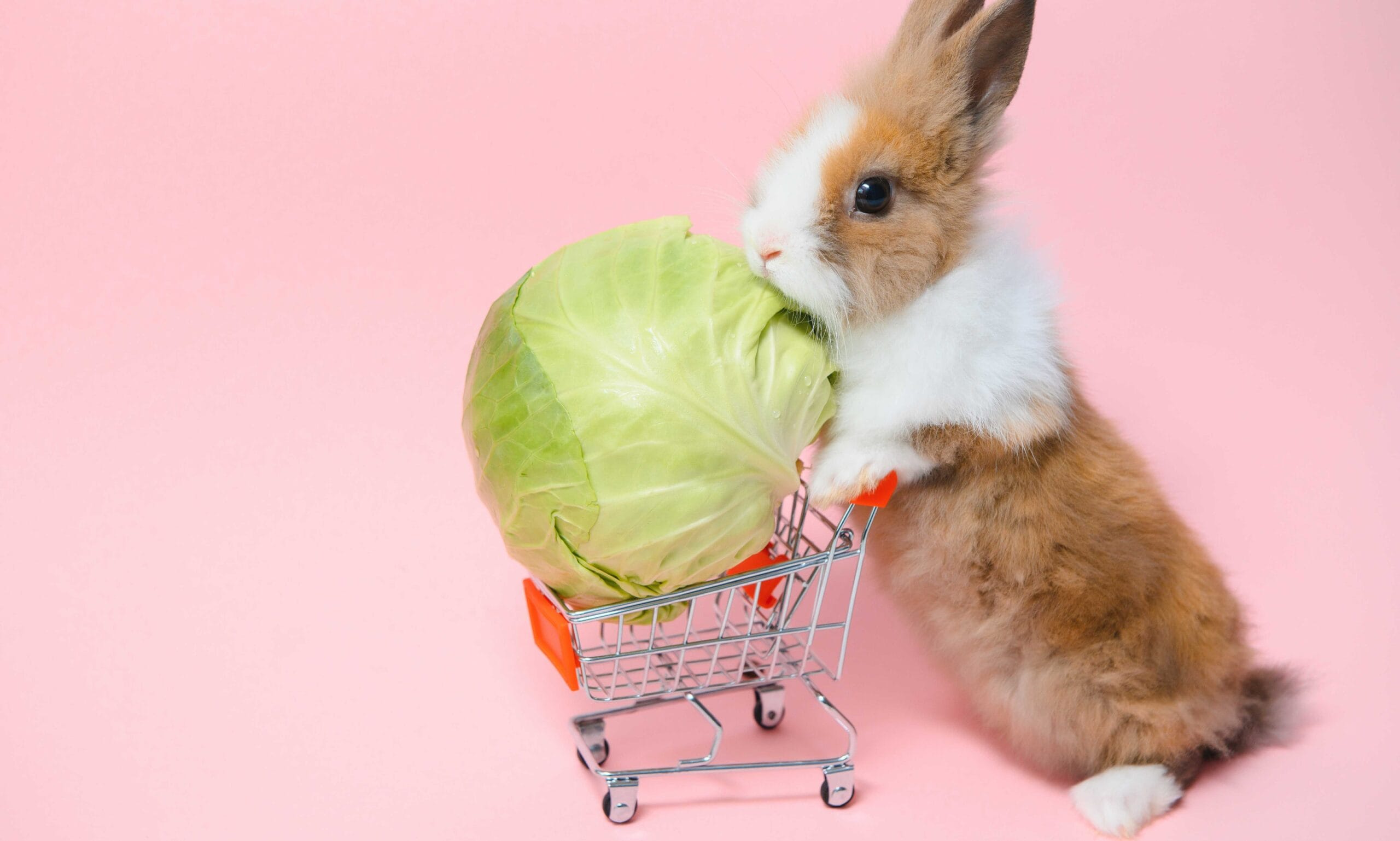
iStock.com/Serhii Hryshchyshen
- Alfalfa sprouts
- Artichoke
- Arugula
- Asparagus
- Basil
- Beet greens
- Bell peppers
- Bok Choy
- Broccoli
- Brussel sprouts
- Borage leaves
- Cabbage
- Carrots
- Celery
- Chicory
- Cilantro
- Collard greens
- Cucumber leaves
- Cultivated mushrooms
- Dandelion greens
- Dill leaves
- Edible flowers (dandelions, hibiscus, nasturtiums, pansies and roses)
- Endive
- Escarole
- Fennel
- Flat edible Chinese pea pods (without the peas)
- Frisée lettuce
- Kale
- Mache
- Mint
- Mustard greens
- Parsley
- Radicchio
- Radish tops
- Red or green leaf lettuce
- Romaine lettuce
- Spinach
- Spring greens
- Summer squash
- Swiss chard
- Turnip greens
- Watercress
- Wheatgrass
19 Fruits Safe for Rabbits
Always wash all fruit and remove the seeds and stems before offering them to your pet rabbit.
- Apples
- Apricots
- Blueberries
- Cherries
- Currants
- Kiwis
- Mangos
- Melons
- Nectarines
- Oranges, including the peel
- Papayas
- Peaches
- Pears
- Pineapples
- Plums without pits
- Raspberry leaves
- Star fruit
- Strawberries
Fruits and Vegetables Safe to Serve in Moderation
- Bananas: Because of their sugar content, bananas can contribute to obesity. You don’t have to avoid them altogether, but you do need to limit the quantity to avoid a high sugar situation. Dr. Manucy suggests you limit your pet to 1/4-inch of banana per 5 pounds of body weight.
- Chard: “Chard is an acceptable option as a dark, tough, leafy green,” says Dr. Manucy. However, it needs to be fed in small quantities.
- Flowering vegetables such as cauliflower and broccoli: These veggies can cause gas and therefore should be offered to your rabbit in very limited quantities.
- Broccoli stems and leaves: While broccoli florets should remain limited, “a small sampling of the stems and leaves is allowed,” Dr. Manucy notes.
Unsafe Fruits and Vegetables for Rabbits
A handful of fruits and vegetables are unsafe for your rabbit and should never be part of a rabbit’s diet.
- Avocado: Avocados are a fatty fruit that contain a fungicidal toxin called persin, which can be deadly if ingested by a pet rabbit. Persin is perfectly safe for humans, but it’s toxic to rabbits. Rabbits react to the toxic fruit in different ways if eaten, with symptoms varying from severe illness to death.
- Corn: Rabbits cannot digest the corn hull. As such, consuming corn can lead to gastrointestinal (GI) stasis or an intestinal blockage. GI stasis is a condition where food passes too slowly through the GI tract. It can be fatal for rabbits, so avoiding any foods that can cause it is essential to your rabbit’s well-being.
- Legumes: Beans, including broad beans and kidney beans, as well as peas are high in carbohydrates. A carb-heavy diet can lead to obesity and/or cause digestive issues, including malabsorption, bloating and diarrhea. Beans may also pose a choking hazard.
- Iceberg lettuce: Iceberg lettuce can contain lactucarium, which is harmful to a rabbit. Light-colored lettuce is also high in water content, offering little nutritional value to your pet.
- Onions: You should avoid vegetables that are part of the onion family, including chives, leeks and onions. Consumption of such by a rabbit can cause blood abnormalities, according to Dr. Manucy.
- Potatoes: Dr. Manucy puts potatoes on the no-go list because they are high in calories due to starch content, and they provide little nutritional value. Feeding your rabbit potatoes can lead to weight gain, constipation, diarrhea and GI stasis.
- Rhubarb: Rhubarb—especially the leaves—is high in oxalic acid, Dr. Manucy says. If your rabbit ingests too many oxalates, they may not absorb calcium properly. Poor calcium absorption can lead to kidney, digestive system and nervous system damage.
- Wild-grown mushrooms: Mushrooms found in the wild are toxic to rabbits. They can negatively affect a rabbit’s neurologic system and digestive system, including their liver, warns Dr. Manucy.
How To Integrate Fruits and Vegetables into Your Rabbit’s Diet
Introducing fruits and veggies to your rabbit isn’t an all-at-once endeavor. You can’t initially offer large quantities or multiple options to your rabbit. Dr. Manucy gives the following advice.
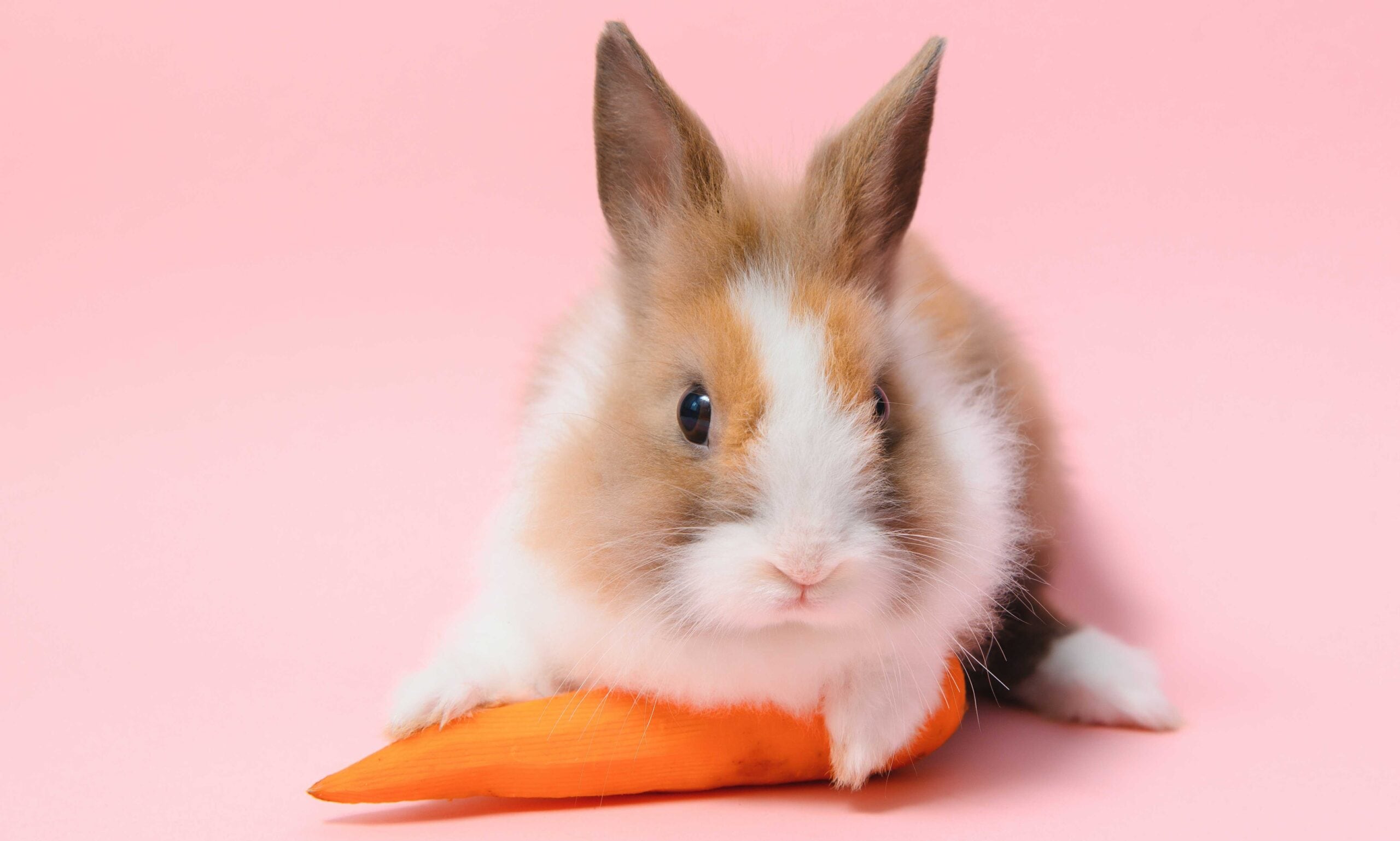
iStock.com/Serhii Hryshchyshen
1. Start with Grass Hay
It’s extremely important to begin the process by offering grass hay for at least 2 weeks before you begin introducing fresh fruits and veggies.
“This will help the GI tract motility and gut flora prepare to handle the fresh foods. Then fresh produce may be introduced,” Dr. Manucy explains.
2. Offer One Type of Leafy Green at a Time
- When it comes to leafy greens, begin slowly. Offer your rabbit just one type of green at a time every 3 days. This will give you the opportunity to see how your rabbit reacts to each one. If you observe softer stools for a couple of days, discontinue that particular green and don’t offer it again.
- Serve 1 cup of packed leafy greens per 2 pounds of body weight. This is the maximum amount your rabbit should eat each day, according to Dr. Manucy.
- The ideal mix is three types of greens a day. Keep track of what works so that, ultimately, you’ll be able to feed your rabbit three types of greens each day, which is the ideal mix.
3. Prep and Serve Appropriate Amounts
- Prep. Always wash all fruit and vegetables and remove the seeds and stems before offering them to your pet rabbit.
- Offer gradually. And observe the results by checking your rabbit’s stool in the same way you did for leafy greens.
- Serve 1 leveled tablespoon per 2 pounds of body weight. This is the daily maximum. This max is not per fruit or veggie if you’re offering more than one type, but rather the total combined amount. The quantity of fruits and non-leafy green vegetables that your rabbit can safely consume is much lower than leafy greens.
- Offer fruits and veggies at different times during the day. If possible, divide up the fruits and other veggies, and don’t offer all at once.
4. Throw Away the Excess
After three to four hours of offering fresh fruits and vegetables to your rabbit, remove and dispose of any excess they have not consumed, Dr. Manucy says.
Helpful Feeding Tips for Rabbits
Organic Is Best
When possible, choose organic fresh produce over conventional “for increased nutrition and decreased chemical exposure to pesticides, fungicides and herbicides,” suggests Dr. Manucy.
“Organically grown produce will have less pesticide residue, which may affect their gut microbiome. There may also be higher nutrient density due to richer soil content.”
Change It Up
Rotate the types of greens you feed your rabbit from week to week once you know which ones work for your pet. This will help avoid exposing your furry friend to excessive oxalic acid.
Big or Small Bites
You can cut up your rabbit’s fresh food or you can leave it whole, Dr. Manucy notes. Your rabbit has incisors to chop the food and molars to grind it.
Smaller pieces of food make it easier to measure and limit portions, though.
Age Doesn’t Matter
When it comes to selecting fruits and veggies, your rabbit’s age isn’t a deciding factor. Meaning, the answer to the question, “What do bunnies eat?” is the same as the answer to “What do rabbits eat?” Anything on the safe list or the use-in-moderation list is acceptable for bunnies and adult rabbits.
Just be certain to follow the serving size guidelines, because the amount your furry friend can safely consume is based on their weight.
One New Food at a Time
Offer only one new fruit or vegetable at a time, so you can be certain it works for your rabbit.
If you’re offering more than one new food at once and your rabbit doesn’t respond well, you won’t know which fruit or vegetable is causing the problem.
Hydrate, Hydrate, Hydrate
“Water is important to maintain healthy urine production and healthy digestion with formed fecal pellets,” Dr. Manucy says. “A lack of hydration with an improper diet may contribute to bladder stone formation and GI stasis in rabbits.”
Your rabbit may drink from a water bowl or a sipper bottle.
“Be sure that there are no clogs in the sipper dispenser and the bowl is not soiled with food, feces or tipped over. Fresh water should be offered daily,” she says.
Ensure Full-Time Food Options
Rabbits are nibblers, Dr. Manucy says, so you should make sure your rabbit always has access to food, especially hay.
Remember, fruits and veggies are treats meant to supplement their diet. A well-balanced diet is necessary for your rabbit’s health.
Don’t Forget Their Teeth!
To help keep your rabbit’s continuously growing teeth healthy, make chew toys available to your rabbit.
Say “No” to Oats
Oats are a grain and therefore are not recommended for rabbits.
“They are sometimes baked into commercial fruit or vegetable treats, but should be fed in limited amounts since they are not beneficial nutritionally,” Dr. Manucy explains.
Expert-Recommended Store-Bought Snacks for Your Rabbit
If you’re not able to feed your rabbit fresh produce for a short period of time, Dr. Manucy recommends any of the following treat options as a temporary substitute.
Recommended Products
Recommended Products

